What does it mean to be part of a community? In this episode, the Fellows discuss ways in which community has manifested itself in their lives.
You can enjoy the episode in its entirety or listen to segments from particular Fellows.
Frank 5 Episode 4 (Community): Full Episode
What does it mean to be part of a community? In this episode, the Fellows discuss ways in which community has manifested itself in their lives
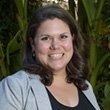 “I really felt the weight of the things I had been given.”
“I really felt the weight of the things I had been given.”
Kara Peterman ’09 speaks with Professor K. Elizabeth Stevens.
Kara is a structural engineering experimentalist who joined the department of Civil and Environmental Engineering at UMass Amherst in 2016. She is passionate about outreach and has promoted the advancement of underrepresented groups in engineering for over a decade.
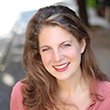 “There’s a danger in taking what you’re making to a community and saying you should watch this.”
“There’s a danger in taking what you’re making to a community and saying you should watch this.”
Nell Bang-Jansen ’11 speaks with Professor Tim Burke.
Nell is a Philadelphia-based theater director and creator and is currently working on a theater piece made with and for people who work as caregivers.
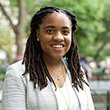 “I definitely learned a lot outside of the classroom.”
“I definitely learned a lot outside of the classroom.”
Marissa Davis ’08 speaks with Professor Rachel Buurma.
Marissa is a bridge-figure, social engineer and advocate for creating sustainable pathways to a better quality of life for historically disenfranchised communities.
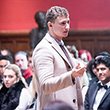 “Let’s experience this together.”
“Let’s experience this together.”
Sam Sussman ’13 speaks with Professor Krista Thomason.
Sam is the co-founder of Extend, a start-up NGO focused on conflict resolution education in Israel-Palestine. He’s also an award winning screenwriter.
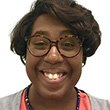 “I cannot spend my life helping other people make money.”
“I cannot spend my life helping other people make money.”
Kimberly St. Julian-Varnon ’12 speaks with Professor Sa’ed Atshan.
Kimberly is a high school history teacher and community college professor. She’s also a Texan, African-American woman, Russian-speaker, and Magic the Gathering player.
Frank 5 Episode 4 (Community): Transcript
Tim Burke: It’s the Frank Five Fellows Podcast Series. Informal conversations with recent liberal arts grads. They’re in business, they’re engineers, they’re educators, and they’re artists. Everyone lives in community but no one knows what the word means. In this episode, the fellows and their faculty partners discuss ways in which community is manifested in their lives. Up next, Kara Peterman and Elizabeth Stephens.
K. Elizabeth Stevens: Is your work important to your sense of, you know to your values in the world, to your sense of living a worthwhile life?
Kara Peterman: Right. I graduated college with a deep sense of, I really felt the weight of the things I’d been given. I had been given a college education, I had been given the opportunity to attend and graduate from Swarthmore. I had been given a lot of things and I began to feel even guilty because of it, if I’m being honest. How best do I make use of these things I have been given? How best do I make use of this life that I’ve had? It occurred to me that one of the best ways to give back is to use your education for something that helps the community, use your education for good, use it for everyone. Even this was a revelation for a 21 year old graduate. It’s not too deep thinking here but as I thought about my own career choice of civil engineering and I thought about my desire to use my education to help others, I thought about what was inherent in civil engineering or structural engineering, which is my specific field, that made me want to help others.
Up until that point, I hadn’t really thought about why I wanted to be a structural engineering, I had some touchstone moments that inspired me to do things that made me interested in the field but ultimately, it’s about providing basic infrastructure. People need food, water, and shelter. Shelter is basic infrastructure. We need roads, we need roofs over our heads to protect us from the elements, we need work places, we need communal places. Working in a field that provided those and not only simply provided them but now that I’m a researcher and now that I’m in the academia, or in the academy I should say, how do we make our structures more equitable? How do we make sure that a structure stands up the same whether you’re rich or your poor? That at this point is extremely, it’s what keeps the fires lit in terms of my own passion. Just working towards the best possible building codes that we can generate, working towards the equitable distribution of safe structures, making sure that a community in the Ozarks, versus a community in New York City, versus a community in northern Virginia, or Florida, or any of these places, that they’re all built to the same standard of safety.
Burke: Up next, Nell Bang-Jensen and Tim Burke.
Burke: What happens the day that you feel profoundly committed to and passionate about a work of theater and you want to take it to a community and the community either hates it or is utterly indifferent to it? Have you had that moment yet? Are you thinking ahead to that moment?
Nell Bang-Jensen: Yeah, it’s a really good question. I think what I probably would do is not do that. I mean, I think there are shows I’ve made that have toured and gone to different places and usually the audiences where they’re being presented are audiences who are pretty used to experimental theater, and who have bought a ticket, and chosen to be there. I think there’s a lot of danger in taking what you’re making to a community and saying you should watch this without talking to them first. I think what I would rather do is go to a place and say what do you need, let’s make that.
There’s some really interesting examples of theaters in the country right now like, Mixed Blood Theater in Minneapolis who they were trying to get people to come to their plays. They even offered free tickets to everyone in their zip code because they realized the neighborhood where the theater was, the fewest people were coming to their plays from that neighborhood. They said, okay, we’ll offer free tickets. Some people came to the first one, and then the next show they did, no one came. They went back and they said, “Oh it’s free, you didn’t come.” They said, “Yeah we didn’t really like that play.” They ended up working with them and they said, “Okay, we hear you.” “What does this neighborhood need?”
Actually, the conversation that people were the most interested in having there was about vaccinations, was happening in neighborhood where people were really divided over that issue. They realized actually what these people were asking for, and they didn’t need a Shakespeare play, what they wanted to make sort of like a public service announcement. That they could then be the forum for them to have these discussions about vaccinations. They made these plays that were all on that medical topic. They did the research, they joined with doctors, they had people from the community act in the plays, and it became a forum for discussion. Granted, artistically I think I don’t want to just make plays about vaccinations, I’m interested in the balance of how we can work with people outside of the industry to create something that is for me, aesthetically and artistically rigorous and not telling people how to think. Also, making that with people who aren’t just in our usual theater bubbles.
Burke: Right. I mean, in fact you were going right towards something I was thinking as you were talking, which is that one of the puzzles about both education and art is that sometimes what we want isn’t what we need, if you know what I mean. That when you’re educating somebody, or being educated, in a sense, there’s a concession from the outset that you already don’t know the things that you will come to know. That you don’t necessarily even know the things that you need to know or want to know. Art seems to me to have that ability to surprise us too. Is there a way to work a happy medium there where you’re giving people what will be needfully surprising rather than in a sense what they already think they want?
Bang-Jensen: Yeah. That’s exactly the balance I strive for. I feel like all theaters should be doing that, I mean I think it’s actually a place that’s set up for an encounter. I think ideally some of what that encounter can do is unsettle certainties. I mean, I think it’s really a place for multiplicity. I talk to my students about this a lot because when they first started going to shows in Philadelphia, they often have the response, “Oh, I really liked that.” “Oh, I didn’t like it.” Most of the things they don’t like are things that they’re unfamiliar with so I really feel like people’s comfort zones are formed by what they’re exposed to. It would be great, and often for a lot of these kids it’s South Pacific and King Lear. I think one of the responsibilities of art makers is to widen that comfort zone and increase where people are on that spectrum so they get more and more comfortable, or at least responsive, or open to work that will challenge them.
I mean, I think a lot about theater is a balance between just comfort, making people be in a space and think about something in a new way, and also recognition and the balance of the two. The recognition of, oh I felt that way before, I have empathy for this person and oh, that was put so beautifully it makes me want to cry. I really believe in, and I think I spoke with you about this playwright, Brandon Jacobs Jenkins who wrote, An Octoroon, a piece I worked on at The Wilma a couple years ago. He really believes that our audiences should represent our democracy in their response. He doesn’t want to make plays where everyone’s standing up on their feet at the end. He wants to make plays where some people are offended and they walk out, and some people are up on their feet at the end, and one person’s crying, and one person’s laughing, and one person’s saying, “Oh, should I not have laughed at that?” Really have it be an experience that’s not collective or communal, but one that’s democratic and leaves the space for that.
Burke: Up next, Marissa Davis and Rachel Buurma.
Marissa Davis: I definitely learned a lot outside of the classroom in college that I think is really transferrable to all of the things that I do now. When I started out, it was creating my own visions for something and then executing on those. Specifically, one of the first things that comes to mind is the work that I was doing in New Orleans my sophomore year of college, working Katrina happened. I was, well I was a lot of things. I was angry, I was sad, I was just disheartened by what it is that I saw before my eyes. Folks largely, low income folks of color, set aside treated different as this hurricane, or not just the hurricane it was the breaching of the levies, which is a whole other political and social issue that really compromised the wellbeing of a lot of these individuals and communities across New Orleans. Thinking about, at the time, just wanting to do something. I didn’t really have a grandiose vision for what that would be for me, I just wanted to help be a part of some community of folks who are gathering supplies to go to New Orleans. Over time, that evolved into actually thinking about what my contribution could be with the access of students, or access to students that I had the resources that Swarthmore and my college had given me. Thinking about what it would take to act on those things.
One of the things that eventually came out of the work that I was doing in New Orleans was creating a self managed youth library on the west bank of New Orleans. The bigger vision for me was thinking through making sure that kids had a space to be able to do their homework, to read. After Katrina, there weren’t that many spaces around but if I could just think about a plan that would actually create this space, then that would at least be one place to start. The execution of that plan ended up sending out a bunch of messages to folks all across Philadelphia while I was still at Swarthmore to get a bunch of books donated and shipped all of that to New Orleans.
By the time we had put the library together, it was over 900 books that we had gotten for ages from five up to 18 that the kinds of books that were available. Actually labeling them, categorizing them, and cataloging them so that it would be an actual library we could check in and check out. Building the bookshelves that were needed to keep all the books in order. All of that came through just thinking, all right well if I think through buying a bunch of bookshelves, I don’t have the kind of money to buy really nice bookshelves but I know that there is a lumberyard somewhere in the city here. If I buy the wood and can get some people to help me build them, then I have something. It was just breaking down the different pieces that I needed to actually get the job done.
I think having had that experience, it made me more aware of how to look at a particular vision or idea and really dissect it to thinking about what is necessary to actually be on the other side of this. I think there is almost both a familiarity and understanding of someone else’s vision that because I had been in the position of having my own vision and having to think about executing that, just putting myself in that person’s shoes as a person with a vision. Thinking about, okay if this is how I want people to feel, or if these are my goals and outcomes by the end of this experience, what will it take to actually do that? Who do I need to reach out to? What are the resources that I need to get this done? What kind of research and investigation do I need to do and begin in order to find out more of what I need to get the job done?
Burke: Up next, Sam [Sussman 00:14:46] and Krista Thomason.
Krista Thomason: My gosh, you were 22 when you sort of did the first trip and here you’re leading as program leaders for ultimately, the college age students who are certainly if not your age, not that much further away from your age. Did you feel ready?
Sam Sussman: Yeah, the best part of Extend for me has always been the peer to peer relationship that I try to keep with participants because it’s not really about my perspective or what I do or don’t know about the conflict. Obviously, I have my own interests and I certainly have spent lots of time studying and learning about the region through my own lens. Once we’re there it’s not really, that’s not why we’re there. We’re there to learn from people whose whole lives have been shaped by living in Israel or Palestine. For me, it was really just about cultivating a sense of openness in conversation. The two things that I felt were most useful for that, one was being the same age as participants and not presenting it as okay, here we know everything, here’s what we want to show you. More, let’s experience this together.
The second great advantage I had was the experience of Swarthmore honors seminars. We’ve always run Extend as a roving Swarthmore honors seminar. Here, let’s get 10 to 12 people together, let’s get as many different views as we can. It’s not going to be reading 900 pages a week, or I don’t know how many pages you assign in your seminar, I had some nutty professors. All with their love, but also nutty. You know, it’s not going to be reading 900 pages but it is going to be listening to a range of views that are as complex and nuance as anything you’ll come across in academic grad school seminar setup. To me, that’s the real value of the program, it’s that we don’t enter with one particular agenda. It’s about deepening your relationship to this region emotionally, intellectually, politically, and interpersonally. That means a learning experience.
Thomason: Tell me about somebody you met at Swarthmore, a fellow student who helped you realize something about yourself or who changed the way you looked at things and why.
Sussman: I’ll pick someone who influenced me a lot that maybe doesn’t know it.
Thomason: Okay.
Sussman: When I was in my first year at Swarthmore, so I was a junior, I was going on a birthright trip to Israel and I really wanted to travel in the West Bank afterwards. I had been to Israel before but never to the West Bank and I wanted to meet with Palestinians, particularly in civil society, people who were working on human rights issues. I had studied the conflict a lot but I hadn’t had those conversations, I hadn’t had a way of having them. I started asking around and there was a student who’d grown up in Ramallah who just as if it was nothing just said, “Oh yeah, my good friend’s aunt works for a human rights NGO that deals with the way conflict affects women and children, she’d be happy to meet with you.” It was such a small thing, but as I got to know her friend’s aunt, whose now become a good friend of mine, I just came to appreciate more what this involved for that person.
Here’s someone who’d grown up in Ramallah through the second [inaudible 00:19:00], who’d routinely seen foreign military troops storming through her city, who knew plenty of people who’d suffered horrific violence in this war. Here I am, this American-Jewish, poli-sci major with a keen interest in the conflict, but I’d never lived there. I mean, who am I to just kind of go, “Oh yeah, it’d be great to meet some Palestinian human rights workers.” It would’ve been, now I think my interest intellectually, and personally, and politically was sincere but she had no reason to have faith in that. Right? Here I was going on a birthright trip, which from her perspective certainly, could’ve, and would’ve, and probably was troubling to think about. Right?
The concept is that I have a birthright to go back to a place that she needs a whole series of permits to get to going from the West Bank into Israel 67 borders. She just had every reason in the world to never follow up, she had every reason in the world to just go, “All right, all right, dude, have fun getting drunk in Tel Aviv.” “Say hi to the sea for me.” She had every reason to, but she didn’t. Instead, she we went well out of her way to put me in touch with someone who is herself very busy, and had plenty of her demands of her time and that person spent the whole day educating me about her perspective on this conflict. There’s just an enormity of goodwill and faith in other people in that act, and that’s the sort of thing I mean when I said that Swarthmore taught me that community and kindness towards other people is much more important than what we consider intelligence.
Burke: Up next, Kimberly St. Julian-Varnon and Sayyid [inaudible 00:21:13].
Sa’ed Atshan: In what way is your work important to you and in what way is your work important to other people?
Kim St. Julian-Varnon: I think my work is important to me because I cannot spend my life helping other people make money. I’ve known that for a long time, I really discovered that at Swarthmore when I was living in Madagascar over the summer with my friend Josh. We were living in this village and just had this realization that my goal in life wasn’t necessarily to help others make profit, but to help others live better in whatever way that meant. I think my job is important to others because a lot of these kids, they have never known that they can achieve more. My job is to help them achieve more. If that means going to college, if that means just sitting down and making a plan so that when they graduate they know and have some idea of what they want to do, that’s totally fine. If that’s helping them find a site for them to do their volunteer work and things like that, that’s cool too. I think that the things I think are important about my job are also what others would think it’s important.
Atshan: What gives you a hope or inspiration?
St. Julian-Varnon: In general? Wow. That’s an interesting question. Especially now, there was a mass shooting in Texas a couple of days ago and it’s Monday so we’ve been talking to our students about it so I’ve been thinking about this, what hope do I have. I think my hope comes in the form of students asking questions about how they can make things better. That’s what gives me hope. It’s really easy if you just watch the news and listen to political podcasts to think the world’s going to hell in a hand basket. When you have kids who are like, this situation’s not okay. How can we make it better? How can I help someone who’s in need. Those situations give me hope.
Burke: Thanks for listening. This podcast was produced by the Aydelotte Foundation and the language and media centers at Swarthmore College. To learn more visit wwwswartmoreedu/aydelotte-foundation.
